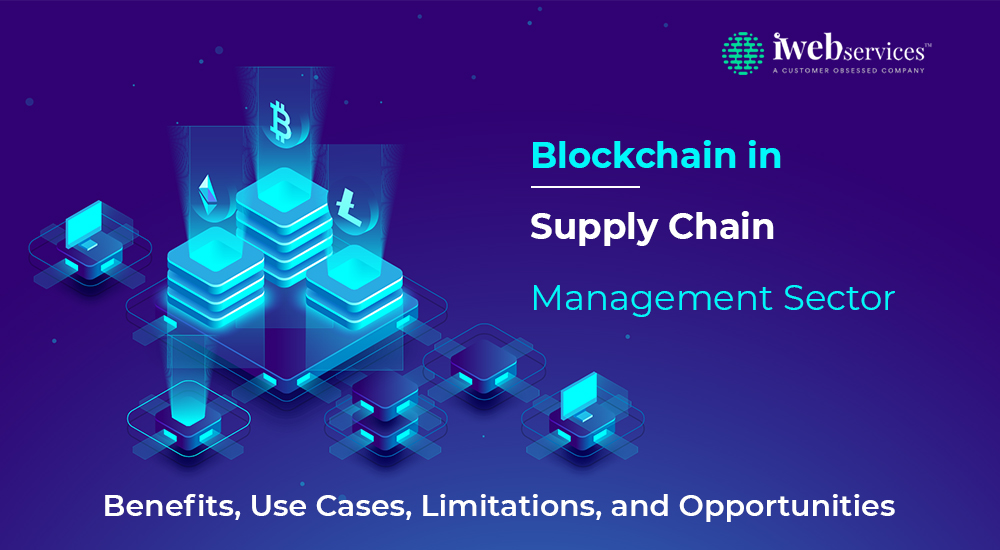Introduction
Blockchain is the technology of the future. With the advent of high-tech data storage and accounting techniques like blockchain, the supply chain management sector has seen a boom in the last decade. More and more people are shifting to blockchain to manage and aid their supply chain management, and it is something that has been giving them consistent returns in the past few years.
Blockchain is a series of information blocks that can store and relay user information to the supply chain management system. These blocks can consolidate information and make supply chain management secure and safe for all users. If you are a blockchain development company or run blockchain development services, you must be aware of the following information compiled for you in this blog post.
Benefits of using blockchain in the supply chain management sector
There is a very sophisticated supply chain in the manufacturing and supply chain management sector that runs everything. Every industry has this kind of supply chain that needs to be managed by contemporary technologies and innovations in their respective industries.
This supply chain might seem easy to manage and incorporate in all sectors, but it has many hectic components and integrations. Theoretically, they might seem redundant. However, these are very difficult to maintain with scale without advanced computing technologies like Artificial Intelligence (AI) and Machine Learning. It is in this form that blockchain technologies can prove to be very highly efficient. Here are some benefits of using blockchain:
Origin tracking facilities
Many transactions occur amongst a vast number of entities in lots of sectors that involve supply chain management. There are, obviously, inefficiencies that attract additional overhead costs and sometimes go far to damage customer reputation also.
Blockchain technologies in this sector provide provenance tracking and facilities that are important for record-keeping so that the fetching of information and solicitation becomes easy. This is done with RFID tags on products and the occasional use of embedded sensors.
Cost reduction and resource efficiency
Reduction of costs and the more reasonable usage of resources is one of the best benefits that blockchain technologies can offer in the supply chain management sector. It is because of facilities like real-time tracking that are offered by these advanced techniques.
With blockchain, overhead costs like mediators and intermediaries can be removed while ensuring the security of transactions at the same time. This goes ahead to reduce the risk of fraudulent transactions at any point and protects customer data with the highest priority.
Scalability
Scalability is a quality that allows customers to be confident with blockchain technology. This scalability allows blockchain and large corporations who use it to access and store large databases from multiple locations worldwide.
Blockchain maintains a high level of security while handling transactions, making sure that the data feed stays customizable. The best feature of this blockchain technique of selective permissions can give the host many benefits and prerogatives.
What are some use cases for blockchain in this sector?
Supply chains in 2021 are becoming increasingly complex day after day. With so many entities interacting with each other at a certain point with the help of multiple transactions, it is getting difficult to log everything safely and securely while also making sure that information is easily accessible. Blockchain is one of the best technologies that you can use here.
This also allows for complete verification of the entire translation flow pretty quickly, ensuring that the transaction’s ability stays intact. There are several more features and use cases that make blockchain the perfect winner in supply chain management.
Provenance
Blockchain technologies can allow the user to know precisely where raw materials or other products are used in the supply chain. This gives you the location of the products and where they originated, and their current location in the supply chain. With the use case of provenance, supply chain users can hastily see how products are moving and their current status.
Finality
The shared ledgers circulated do not hold different values, and their integrity remains intact with blockchain. No matter how many copies are made, the truth inside remains the same, and all copies hold the same version within them. This makes the integrity of the supply chain very high and ensures a certain finality in things as they proceed to resolve any disputes as and when they arise.
Are there any limitations to the usage of blockchain in the supply chain management sector?
No matter how great blockchain might be, there are some limitations to technology usage in the supply chain management sector. Here are some of them:
- Blockchain is not distributed as a system like its other alternatives – Blockchain lacks the features that make it a distributed network. Features like the lack of synergy and the lack of mutual assistance in blockchain make it less attractive for the distributed system
- They are not energy-efficient – Every time the ledger in blockchain is updated with a new transaction at any point, there is a lot of energy required to solve the problems that arise with it. This problem most frequently occurs with the usage of cryptocurrencies like Bitcoin in the supply chain management sector.
- The data that is influenced by blockchain is immutable – One of the prime disadvantages of blockchain is that once the data is written, it cannot be removed under any circumstances. There is absolutely no way a user can remove a trace from a blockchain network without putting their privacy at risk.
Here are some of the opportunities that you should look for with blockchain
There are some potential opportunities that blockchain provides to supply chain management that can be seen and used at some point in the future. Here are some of the potential benefits that you can exploit if you run a blockchain development company:
- Blockchain might improve the traceability of material supply chain products to make sure that corporate standards are adhered to
- Blockchain can reduce paperwork and other administrative costs, saving the carbon footprint of the firm on the environment
- Lower the losses that the company or firm has to incur from counterfeiting of products and the trading of fraudulent products on the open market
- Blockchain can also improve the credibility of the data shared and the public trust that usually comes with it.
Conclusion
Hence, these are some of the things that make blockchain the top contender in the supply chain management sector of the world. The usage of blockchain has a lot of advantages and benefits but also has some considerable disadvantages. However, there are many opportunities available to companies and services with advanced blockchain technologies, most of which can be translated and transformed into potential benefits in the long run. With advantages like complete security and integrity of data and user privacy, there are many things that blockchain technology can do and its alternatives cannot.
 May 12, 2021
May 12, 2021







